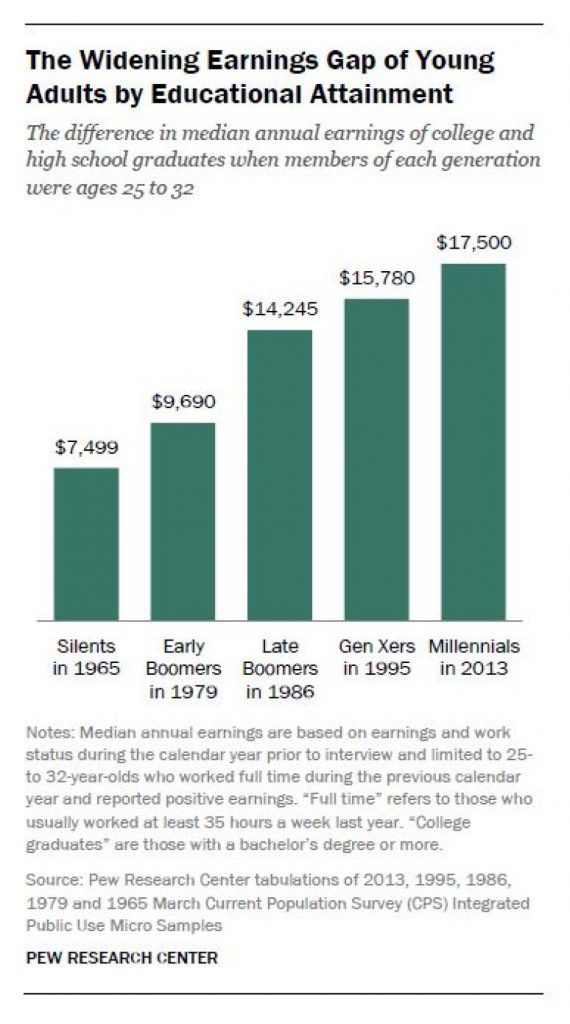Why free bachelors degrees are dangerous for our future

It sounds great in theory - a free bachelor's degree for anyone who wants one! No cost education. Who wouldn't want a free bachelors degree?
That's a big part of the problem.
In theory, making education free and available in the United States to everyone has tremendous benefits to society. Student loans - the second largest type of debt that plagues the country, become a thing of the past. More people - especially the poorer segment of the population, become educated. That means a "smarter" society. Better decision-making. It's all around good, right?
More freedom to try new things and experiment with new technologies.
If "free education" would work like proponents suggest, then the benefit to our society would be too great to ignore. And, the decision to actually make it happen would be universally supported.
But, that's not the whole story. While I wholly support the idea of an educated society, making education "free" would have devastating consequences for the United States.
Think of it this way: What happens when everyone at your local McDonald's holds a bachelors degree? Would those of us who don't choose college have any shot at getting a "real" job?
If everyone holds a degree, what happens to those who don't, and how much more difficult and time-consuming will it be to separate ourselves from the pack?
The problem with making education free
It's accepted wisdom that those with higher-level degrees very often do better in life. They make more money. Enjoy longer careers. College graduates, on average, earned half as much MORE than high school grads in 2015, according to data compiled by the Economic Policy Institute.
The Pew Research Center found that those with college degrees earn an average of $17,500 more every year than those without degrees.

And naturally, this isn't all that striking. If college students didn't earn more, then college wouldn't really be a thing. Young people would attend a trade school and do factory work as people used to do decades ago.
Now, times have changed. Technology has improved and the opportunity to get involved in some amazing societal advances has increased exponentially. Degree programs are increasingly valuable, and those who choose that path tend to earn more. There's really no secret, there.
But, that's only true because they did something different to improve their lives. If everyone had a degree, our society would look very, very different.
And, degrees would also be meaningless. They'd be viewed like a high school diploma is today. Everybody's got one, and they aren't all that convincing as a measure of potential success.
Here's the thing: It's not just the degree that accounts for this increase in salary. It's the delta between degree holders and non-degree holders. The degree itself isn't the magic pill. The delta, however, is.
If you close or eliminate the delta, that doesn't automatically imply that all of us will earn a bunch of money and retire happy. It's not that simple.
Here is the problem with making college free.
Nothing is "free"
Ultimately, the money needs to come from somewhere; colleges can't operate for free. Professors won't "profess" for free. Education still requires money.
Increasing taxes would probably be the easiest way to raise the needed funds. Taxes on everyone, especially the middle class, would most certainly increase. Why? Because that's the way things work in the United States.
According to Bernie Sanders' unsuccessful run for president after intra-party sabotage and corruption, making college "free" would cost an estimated $75 billion. His plan called for a tax on so-called Wall Street speculators, which implies that Sanders was blissfully unaware of how connected, powerful and influential our nation's wealthy population truly is.
Just tax the rich? It's easy to say, but much tougher to implement.
It's not that things are "free". Rather, those bills are paid by someone else.
Free education increases a sense of entitlement
A free education sets a dangerous assumption of entitlement among our younger generation, a big problem that our nation already struggles with. If society owes our young people an education, does society also owe them a job? A car? An entire career? Where does it end?
Are masters degrees next?
What kind of precedent does this set? It's a loaded question, but history has shown a remarkable level of spending justification based on prior decisions.
Frankly, college is not right for everyone, and free education has the effect of encouraging people to attend college just because they can. Regardless of motivation or desire.
Because, why not? It's free.
In this kind of society, 4-year college degrees flood the job market, but the number of jobs doesn't magically expand. Businesses will not suddenly double their workforce. Jobs are based on market demand, and the supply of degree-holders cannot force an expansion of demand.
Economics does not work that way.
As a result, what will all these degree-holders do? The same thing they do now - work in the service and hospitality industry. With degrees.
Does it benefit society to have your Taco Bell order taker hold a business degree?
Free college makes it tougher on everyone
The bigger problem with free education is the new baseline it sets for American corporations. Naturally, most companies want the best and brightest to work for them. The requirements they set for job opportunities are designed to separate the herd - to pick out those who put in more work, more preparation, more education.
A bachelors degree is often the lowest common denominator among most "professional" jobs. Those who have that piece of paper are somehow qualified to apply.
But, here's a question: What if everybody holds a 4-year degree?
Will companies begin to accept job applications from everyone, putting every applicant on the same level? Will everyone magically have a better shot at getting their dream job if the majority of the population holds 4-year degrees?
Unfortunately, the answer is no.
A rampant and sudden increase in the number of 4-year degree holders will increase expectations among American corporations. If a bachelors degree program is the common denominator now, a Masters degree will become the new standard.
Why? Because companies still need to draw a line in the sand. To separate the herd.
Instead of 4-years of schooling, we'll be forced to endure six years. Or in some cases, eight. More schooling. More time. More expense. All because a 4-year bachelors degree has become the new high school diploma.
The standards increase because that 4-year leveling of the playing field essentially puts everyone at the exact same place. If everyone has a 4-year degree, what separates you from me?
What separates you from your neighbor?
The answer is the next highest degree program (a Masters degree) because that becomes the easiest qualifier that is accessible to a large number of people. A post-graduate degree becomes the new "normal". What happens then?
Is free education actually cheaper?
An interesting phenomenon took place in the United Kingdom.
Free tuition turned out to hurt poorer students more. Lucy Hunter Blackburn of the University of Edinburgh (full disclosure: I am a board member of their North American fundraising arm) estimates that the free tuition policy for Scots was regressive. While tuition is free, living expenses are not covered. Free tuition resulted in lower grants used for housing and students in need had to rely more on loans. Richer students, especially those who lived at home, got a huge subsidy. Poorer students, who needed to move to be closer to school, ended up with more debt.
Blackburn estimates the shift to free tuition amounted to a £20 million ($30.9 million) transfer from low-income to high-income families. The English system, in which fees are financed with family money and income-based loans and grants, turned out to be more progressive.
Oops!
While comparing a European country to the United States is far from a direct comparison due to wildly different types of governments, the realities might look extremely similar. We tend to make decisions based on the economic benefit of those in power and not necessarily out of a genuine concern for the people of this country.
Shoddy implementation and expensive bureaucracy would certainly prevent a free education policy from having an effect that matches the popular rhetoric.
Let's focus on trade schools and community college
I don't believe in "leveling the playing field". There, I said it. Let the hate commence!
I don't believe in leveling the playing field because that's not how societies work. I don't believe that nations can ever force success onto its population. The playing field will never be level. Frankly, it can't be.
However, that also doesn't mean that we should do nothing.
Rather than making 4-year degrees "free", what if we focus on improving access to trade schools and community colleges? These schools provide directly applicable skills that relate to some of our nation's most pressing needs. Our nation still needs a skilled workforce of people who aren't doing desk jobs.
Factories need to be worked. Tractors driven. Engines built, maintained and fixed.
In other words, we can't all be so-called "professionals", and 4-year college degrees are relatively accessible ways for those of us who DO want to become desk jockeys to pursue those opportunities.
But, we don't learn how to repair diesel engines sitting in an Art History class at a major 4-year university.
Alright! I know this is a super controversial subject, so where am I completely off base? If everyone held a 4-year degree, what effect would that have on those who don't hold degrees?